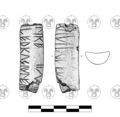SZ-22.2: Difference between revisions
No edit summary |
|||
| Line 24: | Line 24: | ||
== Commentary == | == Commentary == | ||
First published in {{bib|PID}}.<br>Further references: {{bib|NRIE}} 99, '''{{bib|Pisani 1935}}: 94''', {{bib|Battisti 1944}}: 230 f., '''Franz 1957: 107, Anm. 19''', '''Zimmer et al. 1985: 166 (Nr 41)'''.<br>Picture in {{bib|LIR}} (drawing).<br> | First published in {{bib|PID}}.<br>Further references: {{bib|NRIE}} 99, '''{{bib|Pisani 1935}}: 94''', {{bib|Battisti 1944}}: 230 f., '''Franz 1957: 107, Anm. 19''', '''Zimmer et al. 1985: 166 (Nr 41)'''.<br>Picture in {{bib|LIR}} (drawing).<br> | ||
Read {{c|L|L2}}{{c|Χ}}{{c|U|U2}}{{c|H}}{{c|punctuation|punctuation6}}{{c|A}}{{c|U|U2}}{{c|H}}{{c|A|A22}} ''ahua·huχl'' by Whatmough and, following him, Schumacher (alternative {{c|R}}{{c|Χ}}{{c|U|U2}}{{c|H}}{{c|punctuation|punctuation6}}{{c|A}}{{c|U|U2}}{{c|H}}{{c|A|A22}} ''ahua·huχr'') and Mancini (''ahua·huφa''). However, the fact that many of the strokes are joined to the lower ends of the strokes of [[index::SZ-22.1]] (line 2 ''like'') suggests that they were were executed by putting the tool into the existing indentations on the edge of the handle and scratching inward. The strokes being very long, | Read {{c|L|L2}}{{c|Χ}}{{c|U|U2}}{{c|H}}{{c|punctuation|punctuation6}}{{c|A}}{{c|U|U2}}{{c|H}}{{c|A|A22}} ''ahua·huχl'' by Whatmough and, following him, Schumacher (alternative {{c|R}}{{c|Χ}}{{c|U|U2}}{{c|H}}{{c|punctuation|punctuation6}}{{c|A}}{{c|U|U2}}{{c|H}}{{c|A|A22}} ''ahua·huχr'') and Mancini (''ahua·huφa''). However, the fact that many of the strokes are joined to the lower ends of the strokes of [[index::SZ-22.1]] (line 2 ''like'') suggests that they were were executed by putting the tool into the existing indentations on the edge of the handle and scratching inward. The strokes being very long and of differing length, and becoming very thin towards the middle of the handle corroborates this. Therefore, the scratchings should be looked at the other way round. The untidy appearance of the inscription casts doubt on the strokes so far interpreted as the cross-bars of two signs read as {{c|H}}: they being much more slightly scratched than the others, and much longer than they'd need to be. What has been interpreted as some sort of punctuation mark is a vertical row of very short horizontal strokes separating the inscription into two parts which may be argued to be intended as identical, excepting the {{c|Χ|Χ3}} to the very left. A grouping of the strokes into letters cannot be achieved with any certainty. Probably non-script or pseudo-script. | ||
{{bibliography}} | {{bibliography}} | ||
Revision as of 17:01, 11 December 2013
| Inscription | |
|---|---|
| Transliteration: | unknown |
| Original script: | unknown |
| Variant Reading: | § |
|
| |
| Object: | SZ-22 handle () |
| Position: | handle, inside |
| Script: | unknown |
| Direction of writing: | ambiguous |
| Letter height: | 0.9 cm |
| Number of lines: | 1 |
| Craftsmanship: | engraved |
| Current condition: | unknown |
| Date of inscription: | |
| Date derived from: | |
|
| |
| Type: | unknown |
| Language: | unknown |
| Meaning: | unknown |
|
| |
| Alternative sigla: | PID 203 LIR SA-26 |
| Sources: | Schumacher 2004: 137 |
Images
|
Inscription SZ-22.2.
|
|
Commentary
First published in PID.
Further references: NRIE 99, Pisani 1935: 94, Battisti 1944: 230 f., Franz 1957: 107, Anm. 19, Zimmer et al. 1985: 166 (Nr 41).
Picture in LIR (drawing).
Read ![]()
![]()
![]()
![]()
![]()
![]()
![]()
![]()
![]() ahua·huχl by Whatmough and, following him, Schumacher (alternative
ahua·huχl by Whatmough and, following him, Schumacher (alternative ![]()
![]()
![]()
![]()
![]()
![]()
![]()
![]()
![]() ahua·huχr) and Mancini (ahua·huφa). However, the fact that many of the strokes are joined to the lower ends of the strokes of SZ-22.1 (line 2 like) suggests that they were were executed by putting the tool into the existing indentations on the edge of the handle and scratching inward. The strokes being very long and of differing length, and becoming very thin towards the middle of the handle corroborates this. Therefore, the scratchings should be looked at the other way round. The untidy appearance of the inscription casts doubt on the strokes so far interpreted as the cross-bars of two signs read as
ahua·huχr) and Mancini (ahua·huφa). However, the fact that many of the strokes are joined to the lower ends of the strokes of SZ-22.1 (line 2 like) suggests that they were were executed by putting the tool into the existing indentations on the edge of the handle and scratching inward. The strokes being very long and of differing length, and becoming very thin towards the middle of the handle corroborates this. Therefore, the scratchings should be looked at the other way round. The untidy appearance of the inscription casts doubt on the strokes so far interpreted as the cross-bars of two signs read as ![]() : they being much more slightly scratched than the others, and much longer than they'd need to be. What has been interpreted as some sort of punctuation mark is a vertical row of very short horizontal strokes separating the inscription into two parts which may be argued to be intended as identical, excepting the
: they being much more slightly scratched than the others, and much longer than they'd need to be. What has been interpreted as some sort of punctuation mark is a vertical row of very short horizontal strokes separating the inscription into two parts which may be argued to be intended as identical, excepting the ![]() to the very left. A grouping of the strokes into letters cannot be achieved with any certainty. Probably non-script or pseudo-script.
to the very left. A grouping of the strokes into letters cannot be achieved with any certainty. Probably non-script or pseudo-script.
Bibliography
| Battisti 1944 | Carlo Battisti, "Osservazioni sulla lingua delle iscrizioni nell'alfabeto etrusco settentrionale di Bolzano", Studi Etruschi 18 (1944), 199–236. |
|---|---|
| LIR | Alberto Mancini, Le Iscrizioni Retiche [= Quaderni del dipartimento di linguistica, Università degli studi di Firenze Studi 8–9], Padova: Unipress 2009–10. (2 volumes) |

